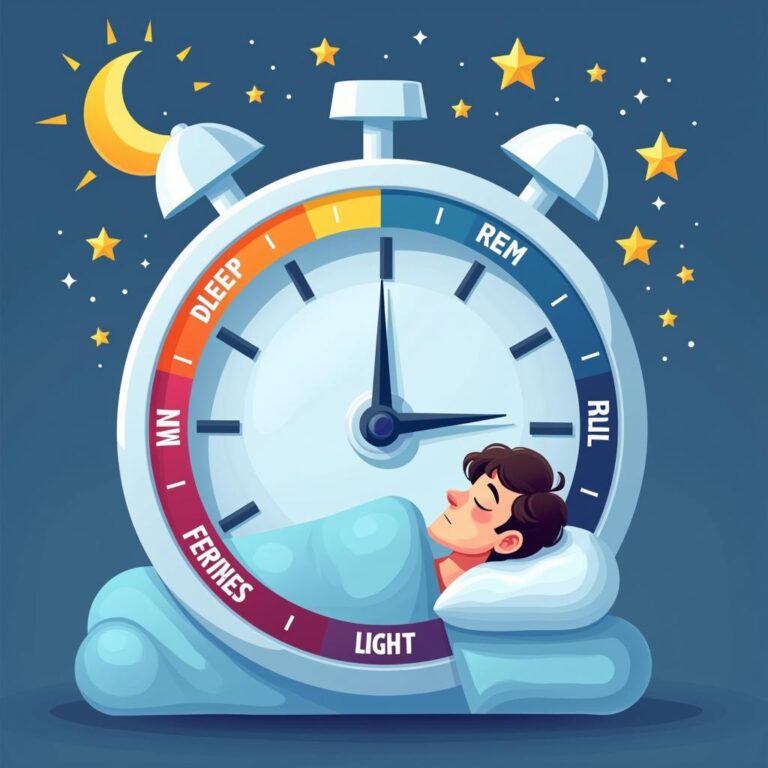Understanding Sleep Cycles and Their Impact on Productivity
In today’s fast-paced world, sleep is often sacrificed at the altar of productivity. However, understanding sleep cycles and their impact on work can lead to significant improvements in our efficiency and output. This article will explore the intricate relationship between sleep cycles and productivity, offering insights on how to optimize sleep for better work performance.
What Are Sleep Cycles?
Sleep cycles are the various stages of sleep that the body goes through each night. A complete sleep cycle typically lasts about 90 minutes and includes four stages: light sleep, deep sleep, and REM (Rapid Eye Movement) sleep. During a typical night, most people will experience four to six sleep cycles. Understanding these stages is crucial because each phase serves different functions in supporting physical and mental health.
Stages of Sleep
- Stage 1 (Light sleep): This is a transitional phase that lasts for several minutes as you move from wakefulness into sleep. Your heart rate and breathing slow down, and your brain wave activity starts to decrease.
- Stage 2 (Deeper sleep): In this phase, your body temperature drops, and heart rate slows even further. Brain waves slow down with occasional bursts of activity known as sleep spindles.
- Stage 3 (Deep sleep): Also referred to as slow-wave sleep, this stage is crucial for physical recovery, growth, and immune function. It’s the hardest stage of sleep to awaken from, making it vital for restful nights.
- REM Sleep: This is the stage where dreaming occurs. It plays a critical role in memory consolidation and emotional regulation, making it essential for cognitive performance during the day.
The Science Behind Sleep Cycles
Each stage of sleep serves a distinct purpose that contributes to overall well-being. Deep sleep is vital for physical restoration, while REM sleep supports cognitive functioning. Insufficient time spent in these critical stages can lead to impaired cognitive abilities, affecting both decision-making and problem-solving skills essential in the workplace.
Studies show that chronic sleep deprivation can reduce attention spans, flexibility, and the capacity to process complex information. This not only hinders individual productivity but can impact team dynamics and organizational performance as well.
How Sleep Cycles Affect Work Performance
Understanding sleep cycles offers valuable insights into optimizing work performance. Here are some key ways sleep influences productivity:
1. Cognitive Function
A well-rested brain is better equipped for critical thinking and creativity. Interruptions in sleep cycles can lead to decreased alertness and longer reaction times, which are detrimental in high-pressure work environments. Ensuring adequate REM sleep is known to enhance problem-solving skills and foster innovative thinking.
2. Emotional Regulation
Sleep plays a pivotal role in regulating emotions. Lack of sleep can increase irritability and anxiety, which can hinder effective communication and collaboration in the workplace. Employees who experience consistent quality sleep demonstrate better emotional intelligence, leading to healthier team interactions.
3. Physical Health
Physical health is intricately linked to sleep quality. Depriving oneself of critical sleep stages can weaken the immune system, leading to increased absenteeism. Organizations benefit from healthy employees who can maintain high levels of productivity and engagement.
4. Time Management
Quality sleep has been shown to improve time management skills. When individuals wake up feeling refreshed, they are more likely to tackle their tasks with motivation and efficiency. Proper resting can help prioritize work, reducing overwhelm and enhancing overall productivity.
Optimizing Sleep for Increased Productivity
Recognizing the vital connection between sleep cycles and productivity can motivate individuals to prioritize their sleep. Here are some strategies to optimize sleep:
1. Maintain a Consistent Sleep Schedule
Going to bed and waking up at the same time every day helps regulate your body’s internal clock, making it easier to fall asleep and wake up feeling refreshed.
2. Create a Sleep-Inducing Environment
A serene sleep environment can significantly enhance the quality of your sleep. Aim for a dark, cool, and quiet environment. Consider using blackout curtains, earplugs, or white noise machines to minimize disturbances.
3. Limit Stimulants
Avoid caffeine and heavy meals several hours before bedtime. These can interfere with your ability to enter the deeper stages of sleep needed for recovery and rejuvenation.
4. Wind Down Before Bed
Establish a relaxing bedtime routine that signals your body it’s time to sleep. This might include reading, meditating, or taking a warm bath. Avoid screens, as the blue light emitted can inhibit melatonin production, making it harder to fall asleep.
Conclusion
Understanding sleep cycles and their impact on productivity is crucial for anyone looking to improve their efficiency at work. The benefits of proper sleep go beyond merely feeling rested; they have profound effects on cognitive function, emotional regulation, physical health, and time management. By recognizing the value of sleep and incorporating strategies to enhance sleep quality, individuals can unlock their full potential, both personally and professionally. Embracing this knowledge can lead to a more productive, fulfilled, and healthier work life.







